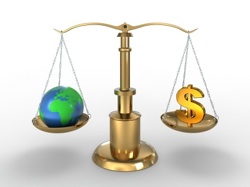by Jen Weiss
Jen Weiss is a Finance Analyst at the Environmental Finance Center.
Mention the words ‘climate change’ and you will likely get a variety of responses. Nationally, opinions range from sentiments like former Vice President Al Gore’s declaration in 2005 that “we are facing a global climate crisis” to geology scientist Martin Keeley’s 2004 statement that “global warming is indeed a scam, perpetrated by scientists with vested interests.” Despite all of the controversy, last month President Barack Obama laid out his own views on climate change: “Our planet is changing in ways that will have profound impacts on all of humankind … those who are already feeling the effects of climate change don’t have time to deny it – they’re busy dealing with it.”
Whether or not you are in agreement that climate change is real or what the long term effects of it may be, one thing is true – it is a huge topic of conversation. And when it comes to conversations about climate change, it isn’t just the environment that gets top billing. Often, the climate discussion comes down to pure economics. President Obama’s June 2013 Climate Action Plan is focused on reducing carbon emissions that cause climate change and affect public health. One of the three primary ways he plans to do this is to cut carbon “pollution” – similar to the way we have reduced pollution from toxins like lead, mercury and arsenic – so Americans can “protect the health of our children and move our economy toward American-made clean energy sources that will create good jobs and lower home energy bills.”




